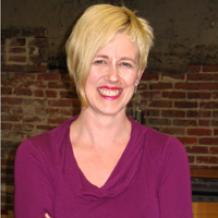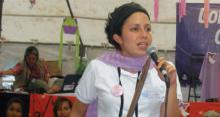Are Mothers Powerful?
Big Ideas
Leading thinkers and activists share game-changing ideas about motherhood and improving maternal health and women's rights.

Are mothers powerful? In many ways it's a surprising question. We associate motherhood with love, nurturing, and domesticity -- with focusing inward, rather than outward. The idea of maternal power -- of mothers having major social clout, authority and influence -- can seem contradictory, almost alien.
In fact, in our culture, we may be more likely to associate motherhood with weakness than power, especially in the workplace and in public life. In a working culture that so highly values 24/7 accessibility, connection, and sheer volume of hours worked, motherhood is too often seen as a sign of lack of focus and commitment. A woman who is pregnant or a mother is seen as less committed and therefore less influential and less powerful. The furor and intense scrutiny surrounding the appointment of a pregnant Marissa Mayer as Yahoo! CEO betrays many of these assumptions. For how, our culture asks, could she deliver in such a high profile job as her mind and her body turn towards motherhood? For many, her impending motherhood signals a "weakness" that is at variance with the "power" they expect from a CEO. We believe that to become a mother is to "give up" your power in the service of your children.
These values and assumptions about maternal power stretch far beyond the workplace. The rationale that allows an American woman even the most basic (by global standards) maternity leave, is due to her "disability," not to the active -- indeed powerful -- role that she must play in bonding with and caring for her baby. And the world's still-shameful statistics on maternal health, domestic violence, and income equality betray a situation where women -- and especially mothers -- still lack power and influence. Our popular media's obsession with celebrity moms venerates motherhood, but its focus on scrutinizing mothers' bodies -- rather than their work, beliefs, or values -- belittles motherhood rather than accentuating its power.
These unspoken cultural rules are highly pervasive, especially in the workplace. I remember being pregnant with my first child, who is now four years old. I felt as if with every inch my belly grew, others' regard for my professional power diminished. Concerns were expressed -- both overtly and covertly -- about my commitment to my job. I was excited to embrace my role as a new mom and to care for my baby, but I too began to expect that my impending role as a mother would engulf my drive, my ambition, and my commitment to the causes I believed in. In fact, the opposite was true.
This week, as the International Museum of Women launches a new online gallery, called Mama Power, we ask how mothers around the globe are finding, expressing, and flexing their power. We found -- as I did -- that for many of the world's women, the experience of motherhood makes them feel and behave in a way that is more powerful, not weaker.
In fact, we found that for many women the experience of motherhood both unlocks and propels their power, and drives them not only to influence their families for the better, but their communities and the world too. For example, the Mama Power gallery features an interview with Bea, a mother and lawyer from Hungary, for whom motherhood has spurred a deep engagement around law and women's human rights, and an interview with Sana, an 18-year-old single mom from Chicago, for whom motherhood has triggered the recognition that women like her are the "backbone" of her community, and a strong potential force for change within in. As a result, Sana feels a renewed commitment to completing her education and embarking on a career. Anne, a mother from Sweden, has renewed passion for her profession as a teacher and its potential to influence society. For each of these women, the experience of becoming a mother has made them more acutely aware of the world they want to see for their children, and more ready to take action -- and assume power -- to advance the possibility of that better world.
The idea of "Mama Power" described by the women we interviewed is given creative expression by V. Kottavei Williams, a mixed-media artist from the U.S. state of Georgia whose vibrant paintings of powerful, engaged mothers expand and empower women's definitions of motherhood. "Once motherhood becomes part of who you are as a woman, your perception of the world around you changes," she says. "Motherhood is like holding a mirror up to one's soul and taking a long look." As we look into our souls, and realize what truly matters to us, our drive to make change in our homes and in the world intensifies.
What, then, to make of these new definitions of maternal power? Kavita Ramdas, a global leader in the field of women's human rights, has some answers. Kavita observes that in many parts of the world, mothers are becoming a powerful force for social change. She cites the significant roles mothers have played in securing peace in Liberia and in protecting education for girls in Afghanistan -- powerful actions that have had a substantial political and cultural impact. For Ramdas, these women are converting the best attributes of mothering into a new way of wielding power.
As I write this piece, I am five months pregnant with my second child. As I feel that new life begin to move and squirm inside of me, I no longer fear a sense of impending weakness or dislocation from the world. I know that turning inward to embrace and nurture this new life will also make me more deeply attuned to the changes I want to see in the world, and more deeply connected to my own power.
The voices and actions of women around the world are telling us that we don't need to give up our power when we become mothers. Far from it. When we become mothers we are given the gift and the opportunity to step into our power. "Mama Power" is not just a recognition of that opportunity, but a responsibility and a commitment to pool that power to advance the lives of women and mothers everywhere. As Sana, our 18-year old exhibition participant, says as she introduces the Mama Power gallery, "if we as women can come together, I think that everything can change."
This piece was previously published in the Huffington Post
Related Content
|
Kavita Ramdas, former CEO of the Global Fund for Women, explains how motherhood can ignite and inspire activism among women, and what changes activist moms have already made in the world. |
V. Kottavei Williams’ work uses recycled records, boxes, paint, and other materials to depict mothers as powerful, vibrant, and engaged. |
Marusia Lopez Cruz, a regional coordinator for Just Associates and mother in Mexico, talks about her work and why motherhood has inspired her to be a more involved activist. |
This visual poem celebrates the strength that many Haitian mothers have displayed in the wake of the devastating 2010 earthquake. |




